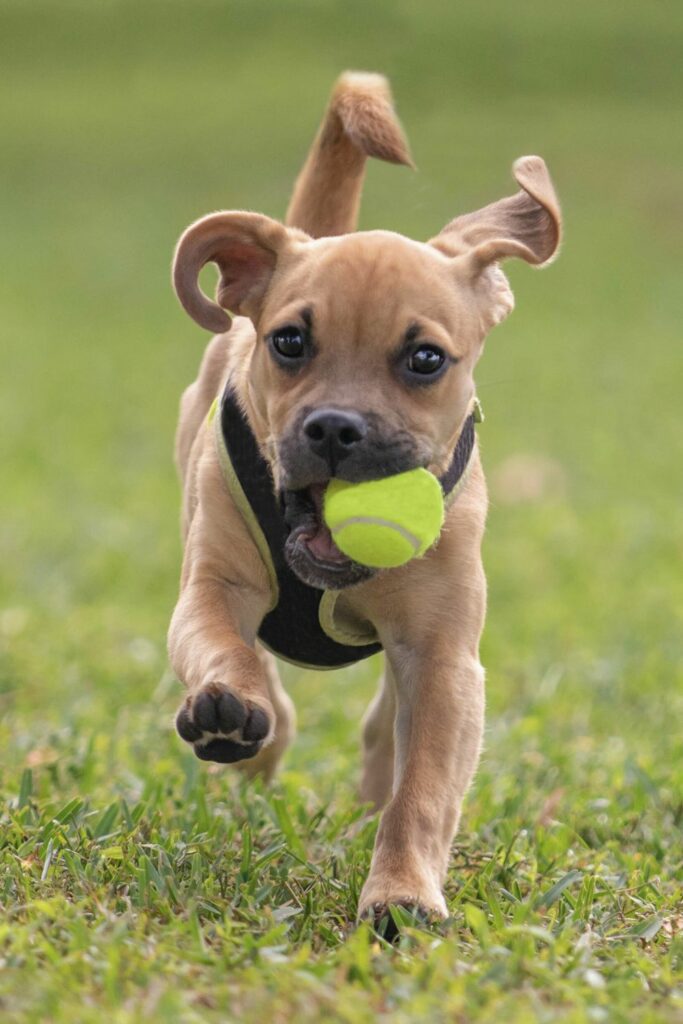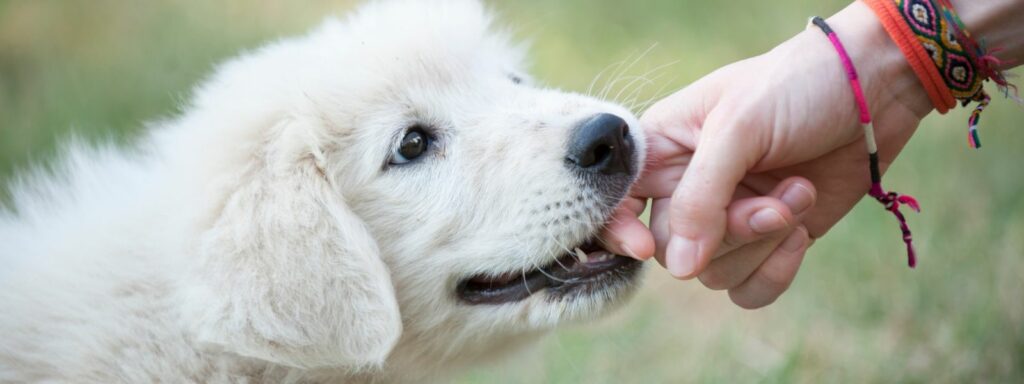Teething and Biting in Puppies
 Synne Hemsen Berg
Synne Hemsen Berg
Bringing a new puppy home is an exciting and heartwarming experience, but it also comes with challenges. One of the most common challenges faced by puppy owners is dealing with teething and biting behaviour. Understanding why puppies engage in these behaviours and learning effective management techniques are crucial for ensuring a harmonious relationship with your furry friend. In this comprehensive guide, we’ll explore the reasons behind teething and biting in puppies and provide you with practical tips to manage and redirect their behaviour.
Understanding Teething in Puppies
During the early months of a puppy’s life, they undergo teething, a natural process where their deciduous (baby) teeth are replaced by permanent adult teeth. Teething usually begins around 3 to 4 months of age and can continue until they are 6 to 8 months old. This process can be uncomfortable and painful for puppies, leading them to seek relief through biting and chewing on various objects.

Typically, puppies start losing their baby incisor teeth at around 3 to 4 months of age. As the adult teeth grow in, they push the baby teeth out, and the baby teeth are often swallowed or fall out while the puppy is eating or playing. In some cases, you may find a baby tooth that has fallen out, but it’s not uncommon for them to go unnoticed.
Why Do Puppies Bite?
Puppy biting is a natural behaviour that serves several purposes during a puppy’s early development. It is a means of exploration and communication, as puppies use their mouths to learn about their environment and interact with their littermates. Additionally, biting is a crucial part of their play behaviour, helping them practice social skills and develop bite inhibition. Through play-biting with their littermates, puppies learn to control the force of their bites, preventing injuries during future interactions. While it is normal for puppies to engage in biting behaviour, it is essential for owners to guide them towards more appropriate ways of interacting with humans and other pets. Common reasons for puppy biting include:
- Exploration and Play: Puppies explore the world around them with their mouths. Just like human babies put objects in their mouths to learn about their environment, puppies use their teeth to investigate textures and tastes.
- Social Interaction: Biting is a natural part of a puppy’s play behaviour. In the litter, puppies play-bite their siblings to learn social skills and develop bite inhibition. However, this behaviour can be problematic when directed towards humans.
- Teething Discomfort: As mentioned earlier, teething can be painful for puppies. Chewing on objects provides them with relief and helps loosen their baby teeth.
- Attention-Seeking: Some puppies learn that biting or nipping gets them attention from their owners, even if it’s negative attention. They may resort to this behaviour to engage with their human family members.

What is normal behaviour?
What is considered normal puppy biting involves gentle mouthing during play, which is typically not painful or aggressive. Puppies may also nibble on their owners’ hands or clothes, but they do not apply excessive pressure. They often display play bows, wagging tails, and relaxed body language during these interactions. Normal puppy biting is usually brief and does not persistently escalate into aggressive behaviour. Normal puppy biting behaviour should stop when your dog is about 6 months to 1 year old.
How to Manage Puppy Biting
While puppy biting is a natural behaviour, it’s good to teach your puppy appropriate behaviour. Here are some effective strategies to manage and redirect biting behaviour:

- Socialisation and Bite Inhibition: Early socialisation with other puppies and well-behaved adult dogs can help puppies learn bite inhibition. In these interactions, other dogs will correct the puppy if they bite too hard, teaching them to control the force of their bites.
- Positive Reinforcement Training: Use positive reinforcement techniques to encourage good behaviour. Reward your puppy with treats, praise, or playtime when they refrain from biting or chewing on appropriate items.
- Teething Toys and Chews: Provide a variety of teething toys and chews specifically designed for puppies. These toys not only soothe their sore gums but also redirect their chewing away from destructive behaviours.
- Time-Outs: If your puppy becomes overly excited and starts biting during play, gently remove yourself from the interaction for a short time-out. This teaches them that biting leads to the end of playtime.
- Obedience Training: Teach basic obedience commands such as “sit,” “stay,” and “leave it.” These commands will help you control your puppy’s behaviour and redirect their attention away from biting. This is especially useful when you have visitors around.
- Ensure you meet your puppy’s daily needs: Dogs have various needs during the day that need to be met in order for them to feel satisfied. Meeting their needs ensures you have a happy dog with good mental health.

Common Mistakes in Managing Puppy Biting
When managing puppy biting, it’s crucial to avoid certain common mistakes that can inadvertently reinforce the behaviour:
- Physical Punishment: Avoid using physical punishment or harsh disciplinary actions. This can lead to fear and aggression in your puppy, making the behaviour worse.
- Inconsistent Reactions: Ensure that all family members are on the same page when it comes to handling biting behaviour. Inconsistent reactions can confuse the puppy and make training less effective.
- Ignoring Positive behaviour: It’s essential to reward and acknowledge your puppy’s good behaviour, not just focus on correcting the bad behaviour.
Seeking Professional Help
If you find that your puppy’s biting behaviour is persistent and difficult to manage on your own, consider seeking help from a professional dog trainer or a puppy behaviourist. They can provide personalised guidance and training techniques to address specific issues with your puppy’s behaviour. We also advise that you take your puppy to puppy classes to receive guidance and training tips to ensure your puppy grows up to be a confident and well-balanced dog.
Teething and consequently biting is normal in puppies, but it requires appropriate management and training to ensure a well-adjusted and well-behaved adult dog. Understanding the reasons behind teething and biting helps us empathize with our furry companions and guide them through this challenging phase of their development. By using positive reinforcement, providing appropriate teething toys, and being consistent in our training, we can shape our puppies into obedient and loving companions. Remember, patience and understanding are key to building a strong bond with your puppy and helping them grow into a happy and well-mannered adult dog.

